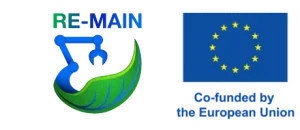Industry 4.0
About the Project
Digital transition has determined (and made it possible) that industrial plants of all kinds need to implement several changes to survive in the medium and long term, among which remote maintenance of the equipment is a major one ande the main principles of the so-called Industry 4.0.
The advent of the information society, improved telecommunications and the wide possibilities opened up by digital technologies have made it possible to move away from the conventional reaction-based, on-site maintenance model to new approaches based on remote, early warning and prevention.
In this context, ReMain Project provides students with the knowledge and competences necessary to install and implement tools, both software and hardware, to create the necessary infrastructure to remotely access the controlling equipment to be able to monitor and maintain the automated industrial models installed in the different training centres of the partners.
The project therefore contributes to filling existing gaps in training, to guarantee a successful entry into the labour market.
Project Details
- Name of the project: Remote MAINtenance of Smart Industry Installations
- Project Acronym: ReMain
- Start date: 01-01-2022 End date: 30-10-2024
- Project Reference: 2021-1-ES01-KA220-VET-000033027
- Eu Grant: 386.717,00 €
- Programme: Erasmus+
- Action Type: Cooperation partnerships in vocational education and training

Primary
Direct beneficiaries students

Secondary
Indirect beneficiaries Training Centres, Automation companies and the General Public. Teachers/Trainers/Researchers
The project partnership involves two public universities: CAMPUS 02 University of Applied Sciences in Austria and MTU, Ireland’s second university of technology. ENAIP Veneto, a social enterprise operating in the field of vocational education and training in Italy with 18 training centres, is also involved. Finally, FESTO, a world leader in industrial training and further education, will provide equipment to all partners and offer practical training.

Remain is co-funded by the Erasmus+ Programme of the European Union..
The views expressed in the working papers, deliverables and reports are those of the project consortium partners. These views have not been adopted or approved by the Commission and should not be relied upon as a statement of the Commission’s or its services’ views.
The European Commission does not guarantee the accuracy of the data included in the working papers and reports, nor does it accept responsibility for any use made thereof.
